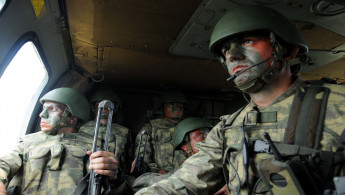Turkey to play a crucial role in Mosul battle
Preparations are under way for the battle to liberate Mosul from the Islamic State group (IS, formerly Isis), which seized control of the city in June following the sudden collapse of the Iraqi army.
And it seems that Ankara will play a major role in the battle.
Turkish Defence Minister Ismet Yilmaz said that Turkey's contributions stem from being part of the international US-led alliance against IS.
"When the time comes, we will conduct the necessary evaluation, prioritising our national interests and honouring our commitments as members of the international alliance," he said.
In a recent news conference, Yilmaz was asked whether this stretched to a ground operation in Iraqi territory.
"Turkey is willing to do its part if others honour their commitments," he replied, echoing a statement from Prime Minister Ahmet Davutoglu.
Analysts say Yilmaz left the door open to several scenarios of Turkish intervention.
| Turkey is willing to do its part if others honour their commitments - Ismet Yilmaz, Turkish defence minister |
Yilmaz is visiting Iraq on Wednesday to meet Iraqi defence and interior ministers - and possibly Iraq's prime minister and the of the Iraqi army's chief of staff.
His itinerary also includes holding talks in Erbil.
But Ankara has already agreed to take part in the fight for Mosul, said the city's governor, Atheel al-Nujaifi, on Sunday night.
Osama al-Nujaifi, Iraq's vice-president and the Mosul governor's brother, held talks with Turkish leaders in Ankara last week after Turkish troops carried out Operation Shah Euphrates inside Syrian territories. The operation involved relocating the remains of Suleyman Shah, the grandfather of the Ottoman Empire's founder.
Many analysts believed the operation was a "rehearsal" for other operations that may be carried out by Turkish troops in Syria and Iraq.
The talks came after Turkey took part in meetings among the military commands of the anti-IS alliance in Jeddah.
Diplomatic sources told al-Araby al-Jadeed that the meetings were of high importance for Turkey, discussing Ankara's possible role in supporting special operations in Syrian and Iraqi territories, alongside military planning to liberate Mosul from IS.
The possibility of using ground troops to fight the IS and "train and arm the moderate Syrian opposition forces" was also reportedly dicussed.
According to Hurriyet, an opposition-leaning newspaper, Turkish diplomatic sources said that Ankara would not use ground troops, but might offer ammunition and logistical support during the battle.
| Turkish diplomatic sources said that Ankara would not send ground troops to take part in the operation. |
The Turkish steps come as the US increases weapons supply in preparation for the battle of Mosul.
Last week, the Pentagon announced that nearly 10,000 M16 rifles, 10,000 pairs of binoculars, 100,000 bullets and 232 Hellfire missiles, as well as other military supplies worth about $17.9m, had arrived in Iraq.
"Any operation against ISIL will be dependent on the Iraqi military being able to perform the mission," Pentagon Press Secretary John Kirby stated on Friday. "With respect to Mosul, [Defence Secretary Ashton Carter] doesn't want to go any faster than the Iraqis are ready and no faster than we can assure ourselves of success."
US statements suggest that the fight for Mosul will start in April or May, with the participation of 12 Iraqi brigades, which include a total of 20,000-30,000 fighters from government and Peshmerga forces.
There is still much speculation over whether such an operation will be successful, given the Iraqi army's obvious weakness and sectarianism, and its failure so far to achieve significant victories against the IS group.
In addition, the Iraqi government has been stalling in forming the National Guard forces, which were supposed to include tribal fighters who would liberate western Iraqi governorates, while Iran continues to offer seeimngly unlimited support for the Popular Mobilisation forces.
Turkey has committed to offering an intensive training programme for Kurdish Peshmerga forces.
This is an edited translation from our Arabic edition.



